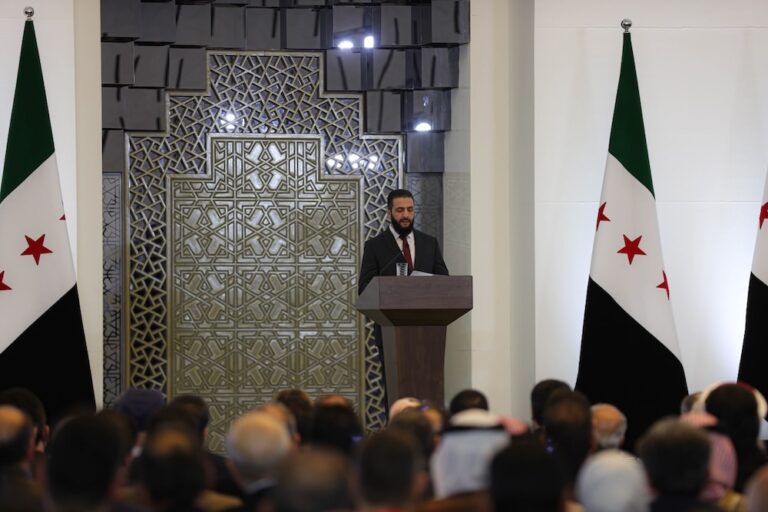Whether across the airwaves, on the Internet, or at the polling booth, dictators are assisted by a range of private actors who are based in free countries but sell their services to unsavory regimes abroad.
By Dean Jackson, guest blogger.
After a wave of post–Cold War democratization, political repression is making a comeback. Freedom House reported in January that 2013 marked the eighth consecutive year of decline in the global state of democracy. But today’s dictators aren’t going it alone. Whether across the airwaves, on the internet, or at the polling booth, they are assisted by a range of private actors who are based in free countries but sell their services to unsavory regimes abroad.
These individuals and organizations act in a range of spheres. In the media, press outlets funded by authoritarian states reach international audiences by hiring Western journalists to peddle their narratives, and Western technology companies sell repressive regimes the equipment they need to police the internet. Meanwhile, election monitors with conflicts of interest increasingly give dictators a free pass to rig the vote as they see fit.
For a clear example, look no further than the infamous English-language, Russian-funded news channel, RT. On March 5, 2014, an American RT anchor announced her resignation live on the air because she was tired of “whitewashing” the actions of world dictators. Independent observers have called the network “blatantly propagandistic”; others have described how RT recruits young, inexperienced American journalists and uses them to push a pro-Kremlin message to U.S. and other audiences.
The Russian government evidently believes that RT provides a great bang for the buck, as the station has been given a lot of bucks. Estimates put its funding at hundreds of millions of dollars, and Russian president Vladimir Putin has insulated it from state budget cuts.
RT is not unique, or even uncommon, in its role as an agent for authoritarians abroad, its recruitment of American staff, or its presence on American soil. Other outlets, such as Iran’s rabidly anti-Semitic Press TV, hire Western officials and journalists to lend credibility to their coverage. Others are paid to spread authoritarian propaganda more widely. Ketchum, an American public relations firm, is on retainer with the Russian government to churn out press releases and Twitter posts, maintain a pro-Kremlin website, and assist with the placement of pro-Kremlin op-eds (including Putin’s notorious New York Times piece on Syria).
In February, it was revealed that a Brussels-based think tank funded by the regime of former Ukrainian president Viktor Yanukovych had paid American conservative bloggers to portray Ukrainian protesters as fascists and anarchists. Like Moscow, Yanukovych’s regime also made use of foreign lobbyists and PR firms to influence Western elites.
Other private companies based in democratic countries have helped authoritarian regimes control dissent at home. Citizenlab, an initiative of the Munk School of Global Affairs at the University of Toronto in Canada, revealed that Hacking Team, an Italian company specializing in security software, sold surveillance technology to Ethiopia and other governments interested in restricting freedom of information on the internet. Hacking Team is based in Europe, but many of its operations rely on servers in the United States.
Days after that report broke, it was revealed that Hacking Team received public funding from the Italian region of Lombardy. Reporters Without Borders has labeled Hacking Team a corporate enemy of the internet, along with four other companies: Amesys, Blue Coat, Gamma International, and Trovicor.
Once sold, the capabilities offered by these “corporate enemies” tend to spread. Technology sold by an Israeli firm to Denmark and by U.S. manufacturers to China has surfaced in Iran, a country that is under international sanctions and is also receiving Chinese assistance in its effort to replace the internet with a government-controlled, “halal” national intranet.
As if propaganda and censorship technology were not enough, some private groups are even willing to help authoritarian rulers rig their elections. Since the “color revolutions” of 2003–05, in which a number of incumbent leaders were deposed or threatened by street protests in the wake of blatant election fraud, there has been a proliferation of election-monitoring organizations with dubious credibility. These sleepy watchdogs range from individual observers to foreign-funded think tanks.
For example, in 2013 Azerbaijan held elections so clearly flawed that the government accidentally released the results ahead of time; luckily for President Ilham Aliyev, a number of “zombie monitors” were ready to send positive signals about the elections’ democratic credentials. Many of these monitoring organizations are part of a loose network with opaque sources of funding, and they occasionally hire Western polling firms to craft favorable numbers for their preferred candidates. They are based in countries including Latvia, Germany, and the United States. In elections across the post-Soviet space, their assessments have clashed with those of more respected monitoring organizations.
In addition to groups, undemocratic regimes sometimes recruit prominent individuals to endorse their elections. In May 2012, the European Stability Initiative accused several members of the Parliamentary Assembly of the Council of Europe of having been wined and dined by the Azeri government in return for positive election assessments.
More recently, the separatist referendum in Crimea was given an all-clear by monitors selected from right-wing European political parties, including nationalist politicians from Poland, Spain, and Hungary. Their approval came despite the fact that the referendum took place under the careful watch of Russian soldiers, with almost no campaign period, and with a ballot that offered no option to vote against separation from Ukraine. It is alleged that more ballots were printed than Crimea has people, and at least one Russian journalist with no Ukrainian citizenship claims that she was allowed to cast a vote. A draft UN report is expected to harshly criticize the conduct of the vote. That a referendum supposedly held to protect Crimea from fascism was monitored by a group of right-wing election observers demonstrates yet again that the Kremlin does not lack a sense of irony.
The examples above are not an exhaustive list—they are only a snapshot of the sophistication with which authoritarian states take advantage of the talents and resources of democratic societies. The hesitance of European governments, including the United Kingdom, to restrict the flow of ill-gotten Russian money into Western banks following the invasion of Crimea demonstrates how deeply the sale of goods and services to authoritarian actors can compromise democratic countries’ responses to tyranny and aggression.
Hired Western enablers of authoritarianism are unlikely to grow scruples on their own, and unfortunately, efforts to coopt or recruit them appear to be growing as more regimes seek to emulate the success of the most innovative despots. What can the world’s democracies do in the face of this exploitation?
Some activities, such as the sale of censorship technology or the handling of illicit funds, are or should be restricted by law, but preventing others may prove more difficult. Shutting down or blocking RT and other authoritarian broadcasters, for example, would violate the democratic values of open debate and free expression, invite accusations of hypocrisy, and be used to justify similar actions by the affected regimes.
If the West cannot ban these activities, it must at least pull them out of the shadows. Propagandists must be unmasked, false election monitors discredited, and lies exposed. It is more important than ever for news consumers to be discerning, because the affiliations and credentials of “experts” cannot be taken for granted. As RT’s slogan reminds us, we must “question more.”
Dean Jackson is a program assistant at the National Endowment for Democracy’s International Forum for Democratic Studies.


